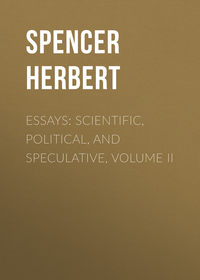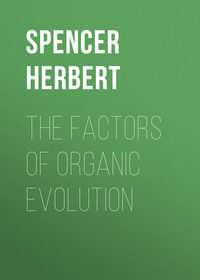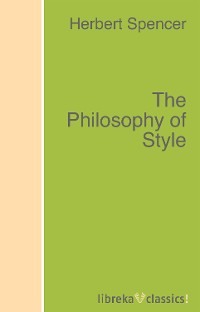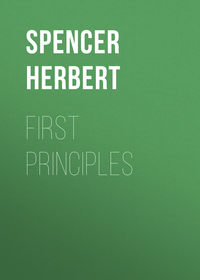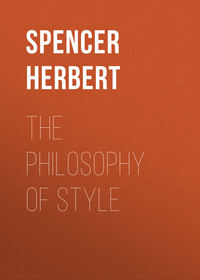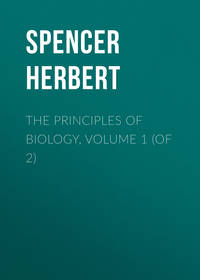 полная версия
полная версияThe Data of Ethics
"Where no covenant hath proceeded, there hath no right been transferred, and every man has a right to everything; and consequently, no action can be unjust. But when a covenant is made, then to break it is unjust; and the definitions of injustice is no other than the not performance of covenant. And whatsoever is not unjust, is just. Therefore, before the names of just and unjust can have place, there must be some coercive power to compel men equally to the performance of their covenants, by the terror of some punishment greater than the benefit they expect by the breach of their covenant."1
In this paragraph the essential propositions are: justice is fulfillment of covenant; fulfillment of covenant implies a power of enforcing it: "just and unjust can have no place" unless men are compelled to perform their covenants. But this is to say that men cannot perform their covenants without compulsion. Grant that justice is performance of covenant. Now suppose it to be performed voluntarily: there is justice. In such case, however, there is justice in the absence of coercion; which is contrary to the hypothesis. The only conceivable rejoinder is an absurd one – voluntary performance of covenant is impossible. Assert this, and the doctrine that right and wrong come into existence with the establishment of sovereignty is defensible. Decline to assert it, and the doctrine vanishes.
From inner incongruities pass now to outer ones. The justification for his doctrine of absolute civil authority as the source of rules of conduct, Hobbes seeks in the miseries entailed by the chronic war between man and man which must exist in the absence of society; holding that under any kind of government a better life is possible than in the state of nature. Now whether we accept the gratuitous and baseless theory that men surrendered their liberties to a sovereign power of some kind, with a view to the promised increase of satisfactions; or whether we accept the rational theory, inductively based, that a state of political subordination gradually became established through experience of the increased satisfactions derived under it; it equally remains obvious that the acts of the sovereign power have no other warrant than their subservience to the purpose for which it came into existence. The necessities which initiate government, themselves prescribe the actions of government. If its actions do not respond to the necessities, they are unwarranted. The authority of law is, then, by the hypothesis, derived; and can never transcend the authority of that from which it is derived. If general good, or welfare, or utility, is the supreme end, and if State enactments are justified as means to this supreme end, then, State enactments have such authority only as arises from conduciveness to this supreme end. When they are right, it is only because the original authority endorses them; and they are wrong if they do not bear its endorsement. That is to say, conduct cannot be made good or bad by law; but its goodness or badness is to the last determined by its effects as naturally furthering, or not furthering, the lives of citizens.
Still more when considered in the concrete, than when considered in the abstract, do the views of Hobbes and his disciples prove to be inconsistent. Joining in the general belief that without such security for life as enables men to go fearlessly about their business, there can be neither happiness nor prosperity, individual or general, they agree that measures for preventing murder, manslaughter, assault, etc., are requisite; and they advocate this or that penal system as furnishing the best deterrents: so arguing, both in respect of the evils and the remedies, that such and such causes will, by the nature of things, produce such and such effects. They recognize as inferable à priori, the truth that men will not lay by property unless they can count with great probability on reaping advantages from it; that consequently where robbery is unchecked, or where a rapacious ruler appropriates whatever earnings his subjects do not effectually hide, production will scarcely exceed immediate consumption; and that necessarily there will be none of that accumulation of capital required for social development, with all its aids to welfare. In neither case, however, do they perceive that they are tacitly asserting the need for certain restraints on conduct as deducible from the necessary conditions to complete life in the social state; and are so making the authority of law derivative and not original.
If it be said by any belonging to this school that certain moral obligations, to be distinguished as cardinal, must be admitted to have a basis deeper than legislation, and that it is for legislation not to create but merely to enforce them – if, I say, admitting this, they go on to allege a legislative origin for minor claims and duties; then we have the implication that whereas some kinds of conduct do, in the nature of things, tend to work out certain kinds of results, other kinds of conduct do not, in the nature of things, tend to work out certain kinds of results. While of these acts the naturally good or bad consequences must be allowed, it may be denied of those acts that they have naturally good or bad consequences. Only after asserting this can it be consistently asserted that acts of the last class are made right or wrong by law. For if such acts have any intrinsic tendencies to produce beneficial or mischievous effects, then these intrinsic tendencies furnish the warrant for legislative requirements or interdicts; and to say that the requirements or interdicts make them right or wrong is to say that they have no intrinsic tendencies to produce beneficial or mischievous effects.
Here, then, we have another theory betraying deficient consciousness of causation. An adequate consciousness of causation yields the irresistible belief that from the most serious to the most trivial actions of men in society, there must flow consequences which, quite apart from legal agency, conduce to well-being or ill-being in greater or smaller degrees. If murders are socially injurious whether forbidden by law or not – if one man's appropriation of another's gains by force brings special and general evils, whether it is or is not contrary to a ruler's edicts – if non-fulfillment of contract, if cheating, if adulteration, work mischiefs on a community in proportion as they are common, quite irrespective of prohibitions; then, is it not manifest that the like holds throughout all the details of men's behavior? Is it not clear that when legislation insists on certain acts which have naturally beneficial effects, and forbids others that have naturally injurious effects, the acts are not made good or bad by legislation; but the legislation derives its authority from the natural effects of the acts? Non-recognition of this implies non-recognition of natural causation.
§ 20. Nor is it otherwise with the pure intuitionists, who hold that moral perceptions are innate in the original sense – thinkers whose view is that men have been divinely endowed with moral faculties; not that these have resulted from inherited modifications caused by accumulated experiences.
To affirm that we know some things to be right and other things to be wrong, by virtue of a supernaturally given conscience; and thus tacitly to affirm that we do not otherwise know right from wrong; is tacitly to deny any natural relations between acts and results. For if there exist any such relations, then we may ascertain by induction, or deduction, or both, what these are. And if it be admitted that because of such natural relations, happiness is produced by this kind of conduct, which is therefore to be approved, while misery is produced by that kind of conduct, which is therefore to be condemned; then it is admitted that the rightness or wrongness of actions are determinable, and must finally be determined, by the goodness or badness of the effects that flow from them; which is contrary to the hypothesis.
It may, indeed, be rejoined that effects are deliberately ignored by this school; which teaches that courses recognized by moral intuition as right, must be pursued without regard to consequences. But on inquiry it turns out that the consequences to be disregarded are particular consequences, and not general consequences. When, for example, it is said that property lost by another ought to be restored, irrespective of evil to the finder, who possibly may, by restoring it, lose that which would have preserved him from starvation, it is meant that in pursuance of the principle, the immediate and special consequences must be disregarded, not the diffused and remote consequences. By which we are shown that though the theory forbids overt recognition of causation, there is an unavowed recognition of it.
And this implies the trait to which I am drawing attention. The conception of natural causation is so imperfectly developed that there is only an indistinct consciousness that throughout the whole of human conduct necessary relations of causes and effects prevail, and that from them are ultimately derived all moral rules, however much these may be proximately derived from moral intuitions.
§ 21. Strange to say, even the utilitarian school, which, at first sight, appears to be distinguished from the rest by recognizing natural causation, is, if not so far from complete recognition of it, yet very far.
Conduct, according to its theory, is to be estimated by observation of results. When, in sufficiently numerous cases, it has been found that behavior of this kind works evil while behavior of that kind works good, these kinds of behavior are to be judged as wrong and right respectively. Now though it seems that the origin of moral rules in natural causes, is thus asserted by implication, it is but partially asserted. The implication is simply that we are to ascertain by induction that such and such mischiefs or benefits do go along with such and such acts; and are then to infer that the like relations will hold in future. But acceptance of these generalizations and the inferences from them does not amount to recognition of causation in the full sense of the word. So long as only some relation between cause and effect in conduct is recognized, and not the relation, a completely scientific form of knowledge has not been reached. At present, utilitarians pay no attention to this distinction. Even when it is pointed out they disregard the fact that empirical utilitarianism is but a transitional form to be passed through on the way to rational utilitarianism.
In a letter to Mr. Mill, written some sixteen years ago, repudiating the title anti-utilitarian, which he had applied to me (a letter subsequently published in Mr. Bain's work on Mental and Moral Science), I endeavored to make clear the difference above indicated; and I must here quote certain passages from that letter.
The view for which I contend is, that Morality, properly so-called – the science of right conduct – has for its object to determine how and why certain modes of conduct are detrimental, and certain other modes beneficial. These good and bad results cannot be accidental, but must be necessary consequences of the constitution of things; and I conceive it to be the business of Moral Science to deduce, from the laws of life and the conditions of existence, what kinds of action necessarily tend to produce happiness, and what kinds to produce unhappiness. Having done this, its deductions are to be recognized as laws of conduct; and are to be conformed to irrespective of a direct estimation of happiness or misery.
Perhaps an analogy will most clearly show my meaning. During its early stages, planetary Astronomy consisted of nothing more than accumulated observations respecting the positions and motions of the sun and planets; from which accumulated observations it came by-and-by to be empirically predicted, with an approach to truth, that certain of the heavenly bodies would have certain positions at certain times. But the modern science of planetary Astronomy consists of deductions from the law of gravitation – deductions showing why the celestial bodies necessarily occupy certain places at certain times. Now, the kind of relation which thus exists between ancient and modern Astronomy is analogous to the kind of relation which, I conceive, exists between the Expediency-Morality and Moral Science, properly so called. And the objection which I have to the current Utilitarianism is, that it recognizes no more developed form of Morality – does not see that it has reached but the initial stage of Moral Science.
Doubtless if utilitarians are asked whether it can be by mere chance that this kind of action works evil and that works good, they will answer – No: they will admit that such sequences are parts of a necessary order among phenomena. But though this truth is beyond question; and though if there are causal relations between acts and their results, rules of conduct can become scientific only when they are deduced from these causal relations; there continues to be entire satisfaction with that form of utilitarianism in which these causal relations are practically ignored. It is supposed that in future, as now, utility is to be determined only by observation of results: and that there is no possibility of knowing, by deduction from fundamental principles, what conduct must be detrimental and what conduct must be beneficial.
§ 22. To make more specific that conception of ethical science here indicated, let me present it under a concrete aspect, beginning with a simple illustration and complicating this illustration by successive steps.
If, by tying its main artery, we stop most of the blood going to a limb, then, for as long as the limb performs its function, those parts which are called into play must be wasted faster than they are repaired: whence eventual disablement. The relation between due receipt of nutritive matters through its arteries, and due discharge of its duties by the limb is a part of the physical order. If, instead of cutting off the supply to a particular limb, we bleed the patient largely, so drafting away the materials needed for repairing not one limb but all limbs, and not limbs only but viscera, there results both a muscular debility and an enfeeblement of the vital functions. Here, again, cause and effect are necessarily related. The mischief that results from great depletion, results apart from any divine command, or political enactment, or moral intuition. Now advance a step. Suppose the man to be prevented from taking in enough of the solid and liquid food containing those substances continually abstracted from his blood in repairing his tissues: suppose he has cancer of the esophagus and cannot swallow – what happens? By this indirect depletion, as by direct depletion, he is inevitably made incapable of performing the actions of one in health. In this case, as in the other cases, the connection between cause and effect is one that cannot be established, or altered, by any authority external to the phenomena themselves. Again, let us say that instead of being stopped after passing his mouth, that which he would swallow is stopped before reaching his mouth; so that day after day the man is required to waste his tissues in getting food, and day after day the food he has got to meet this waste, he is forcibly prevented from eating. As before, the progress toward death by starvation is inevitable – the connection between acts and effects is independent of any alleged theological or political authority. And similarly if, being forced by the whip to labor, no adequate return in food is supplied to him, there are equally certain evils, equally independent of sacred or secular enactment.
Pass now to those actions more commonly thought of as the occasions for rules of conduct. Let us assume the man to be continually robbed of that which was given him in exchange for his labor, and by which he was to make up for nervo-muscular expenditure and renew his powers. No less than before is the connection between conduct and consequence rooted in the constitution of things; unchangeable by State-made law, and not needing establishment by empirical generalization. If the action by which the man is affected is a stage further away from the results, or produces results of a less decisive kind, still we see the same basis for morality in the physical order. Imagine that payment for his services is made partly in bad coin; or that it is delayed beyond the date agreed upon; or that what he buys to eat is adulterated with innutritive matter. Manifestly, by any of these deeds which we condemn as unjust, and which are punished by law, there is, as before, an interference with the normal adjustment of physiological repair to physiological waste. Nor is it otherwise when we pass to kinds of conduct still more remotely operative. If he is hindered from enforcing his claim, if class-predominance prevents him from proceeding, or if a bribed judge gives a verdict contrary to evidence, or if a witness swears falsely, have not these deeds, though they affect him more indirectly, the same original cause for their wrongness?
Even with actions which work diffused and indefinite mischiefs it is the same. Suppose that the man, instead of being dealt with fraudulently, is calumniated. There is, as before, a hinderance to the carrying on of life-sustaining activities; for the loss of character detrimentally affects his business. Nor is this all. The mental depression caused partially incapacitates him for energetic activity, and perhaps brings on ill-health. So that maliciously or carelessly propagating false statements tends both to diminish his life and to diminish his ability to maintain life. Hence its flagitiousness.
Moreover, if we trace to their ultimate ramifications the effects wrought by any of these acts which morality called intuitive reprobates – if we ask what results not to the individual himself only, but also to his belongings – if we observe how impoverishment hinders the rearing of his children, by entailing under-feeding or inadequate clothing, resulting perhaps in the death of some and the constitutional injury of others; we see that by the necessary connections of things these acts, besides tending primarily to lower the life of the individual aggressed upon, tend, secondarily, to lower the lives of all his family, and thirdly, to lower the life of society at large; which is damaged by whatever damages its units.
A more distinct meaning will now be seen in the statement that the utilitarianism which recognizes only the principles of conduct reached by induction, is but preparatory to the utilitarianism which deduces these principles from the processes of life as carried on under established conditions of existence.
§ 22. Thus, then, is justified the allegation made at the outset, that, irrespective of their distinctive characters and their special tendencies, all the current methods of ethics have one general defect – they neglect ultimate causal connections. Of course I do not mean that they wholly ignore the natural consequences of actions; but I mean that they recognize them only incidentally. They do not erect into a method the ascertaining of necessary relations between causes and effects, and deducing rules of conduct from formulated statement of them.
Every science begins by accumulating observations, and presently generalizes these empirically; but only when it reaches the stage at which its empirical generalizations are included in a rational generalization, does it become developed science. Astronomy has already passed through its successive stages: first collections of facts; then inductions from them; and lastly deductive interpretations of these, as corollaries from a universal principle of action among masses in space. Accounts of structures and tabulations of strata, grouped and compared, have led gradually to the assigning of various classes of geological changes to igneous and aqueous actions; and it is now tacitly admitted that Geology becomes a science proper, only as fast as such changes are explained in terms of those natural processes which have arisen in the cooling and solidifying earth, exposed to the sun's heat and the action of the moon upon its ocean. The science of life has been, and is still, exhibiting a like series of steps; the evolution of organic forms at large is being affiliated on physical actions in operations from the beginning; and the vital phenomena each organism presents are coming to be understood as connected sets of changes, in parts formed of matters that are affected by certain forces and disengage other forces. So is it with mind. Early ideas concerning thought and feeling ignored everything like cause, save in recognizing those effects of habits which were forced on men's attention and expressed in proverbs; but there are growing up interpretations of thought and feeling as correlates of the actions and reactions of a nervous structure, that is influenced by outer changes and works in the body adapted changes: the implication being that Psychology becomes a science as fast as these relations of phenomena are explained as consequences of ultimate principles. Sociology, too, represented down to recent times only by stray ideas about social organization, scattered through the masses of worthless gossip furnished us by historians, is coming to be recognized by some as also a science; and such adumbrations of it as have from time to time appeared in the shape of empirical generalizations, are now beginning to assume the character of generalizations made coherent by derivation from causes lying in human nature placed under given conditions. Clearly then, Ethics, which is a science dealing with the conduct of associated human beings, regarded under one of its aspects, has to undergo a like transformation; and, at present undeveloped, can be considered a developed science only when it has undergone this transformation.
A preparation in the simpler sciences is pre-supposed. Ethics has a physical aspect; since it treats of human activities which, in common with all expenditures or energy, conform to the law of the persistence of energy: moral principles must conform to physical necessities. It has a biological aspect; since it concerns certain effects, inner and outer, individual and social, of the vital changes going on in the highest type of animal. It has a psychological aspect; for its subject matter is an aggregate of actions that are prompted by feelings and guided by intelligence. And it has a sociological aspect; for these actions, some of them directly and all of them indirectly, affect associated beings.
What is the implication? Belonging under one aspect to each of these sciences – physical, biological, psychological, sociological – it can find its ultimate interpretations only in those fundamental truths which are common to all of them. Already we have concluded in a general way that conduct at large, including the conduct Ethics deals with, is to be fully understood only as an aspect of evolving life; and now we are brought to this conclusion in a more special way.
§ 23. Here, then, we have to enter on the consideration of moral phenomena as phenomena of evolution; being forced to do this by finding that they form a part of the aggregate of phenomena which evolution has wrought out. If the entire visible universe has been evolved – if the solar system as a whole, the earth as a part of it, the life in general which the earth bears, as well as that of each individual organism – if the mental phenomena displayed by all creatures, up to the highest, in common with the phenomena presented by aggregates of these highest – if one and all conform to the laws of evolution; then the necessary implication is that those phenomena of conduct in these highest creatures with which Morality is concerned, also conform.
The preceding volumes have prepared the way for dealing with morals as thus conceived. Utilizing the conclusions they contain, let us now observe what data are furnished by these. We will take in succession – the physical view, the biological view, the psychological view, and the sociological view.
CHAPTER V.
THE PHYSICAL VIEW
§ 24. Every moment we pass instantly from men's perceived actions to the motives implied by them; and so are led to formulate these actions in mental terms rather than in bodily terms. Thoughts and feelings are referred to when we speak of any one's deeds with praise or blame; not those outer manifestations which reveal the thoughts and feelings. Hence we become oblivious of the truth that conduct as actually experienced consists of changes recognized by touch, sight and hearing.


